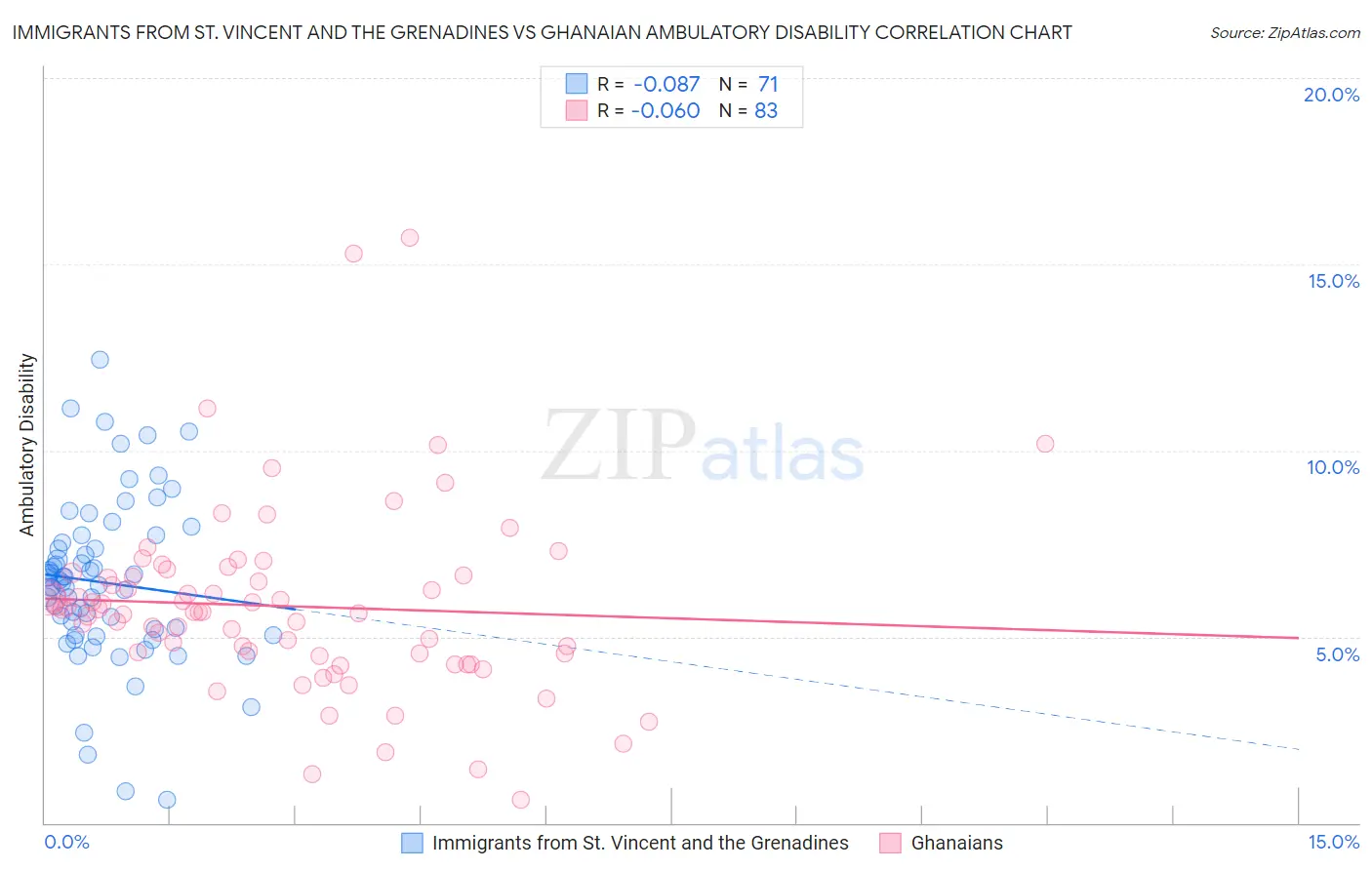Immigrants from St. Vincent and the Grenadines vs Ghanaian Ambulatory Disability
COMPARE
Immigrants from St. Vincent and the Grenadines
Ghanaian
Ambulatory Disability
Ambulatory Disability Comparison
Immigrants from St. Vincent and the Grenadines
Ghanaians
6.9%
AMBULATORY DISABILITY
0.0/ 100
METRIC RATING
293rd/ 347
METRIC RANK
6.0%
AMBULATORY DISABILITY
71.3/ 100
METRIC RATING
157th/ 347
METRIC RANK
Immigrants from St. Vincent and the Grenadines vs Ghanaian Ambulatory Disability Correlation Chart
The statistical analysis conducted on geographies consisting of 56,172,831 people shows a slight negative correlation between the proportion of Immigrants from St. Vincent and the Grenadines and percentage of population with ambulatory disability in the United States with a correlation coefficient (R) of -0.087 and weighted average of 6.9%. Similarly, the statistical analysis conducted on geographies consisting of 190,643,390 people shows a slight negative correlation between the proportion of Ghanaians and percentage of population with ambulatory disability in the United States with a correlation coefficient (R) of -0.060 and weighted average of 6.0%, a difference of 14.0%.

Ambulatory Disability Correlation Summary
| Measurement | Immigrants from St. Vincent and the Grenadines | Ghanaian |
| Minimum | 0.61% | 0.61% |
| Maximum | 12.4% | 15.7% |
| Range | 11.8% | 15.1% |
| Mean | 6.5% | 5.8% |
| Median | 6.5% | 5.7% |
| Interquartile 25% (IQ1) | 5.0% | 4.5% |
| Interquartile 75% (IQ3) | 7.5% | 6.6% |
| Interquartile Range (IQR) | 2.5% | 2.1% |
| Standard Deviation (Sample) | 2.2% | 2.5% |
| Standard Deviation (Population) | 2.2% | 2.4% |
Similar Demographics by Ambulatory Disability
Demographics Similar to Immigrants from St. Vincent and the Grenadines by Ambulatory Disability
In terms of ambulatory disability, the demographic groups most similar to Immigrants from St. Vincent and the Grenadines are Cape Verdean (6.9%, a difference of 0.19%), Cheyenne (6.9%, a difference of 0.24%), Crow (6.9%, a difference of 0.26%), West Indian (6.9%, a difference of 0.30%), and Scotch-Irish (6.9%, a difference of 0.40%).
| Demographics | Rating | Rank | Ambulatory Disability |
| Yakama | 0.0 /100 | #286 | Tragic 6.8% |
| U.S. Virgin Islanders | 0.0 /100 | #287 | Tragic 6.8% |
| Immigrants | Nonimmigrants | 0.0 /100 | #288 | Tragic 6.9% |
| Immigrants | Dominica | 0.0 /100 | #289 | Tragic 6.9% |
| Scotch-Irish | 0.0 /100 | #290 | Tragic 6.9% |
| West Indians | 0.0 /100 | #291 | Tragic 6.9% |
| Cheyenne | 0.0 /100 | #292 | Tragic 6.9% |
| Immigrants | St. Vincent and the Grenadines | 0.0 /100 | #293 | Tragic 6.9% |
| Cape Verdeans | 0.0 /100 | #294 | Tragic 6.9% |
| Crow | 0.0 /100 | #295 | Tragic 6.9% |
| Alaskan Athabascans | 0.0 /100 | #296 | Tragic 6.9% |
| French American Indians | 0.0 /100 | #297 | Tragic 6.9% |
| Immigrants | Grenada | 0.0 /100 | #298 | Tragic 6.9% |
| Puget Sound Salish | 0.0 /100 | #299 | Tragic 6.9% |
| Marshallese | 0.0 /100 | #300 | Tragic 6.9% |
Demographics Similar to Ghanaians by Ambulatory Disability
In terms of ambulatory disability, the demographic groups most similar to Ghanaians are Immigrants from Fiji (6.0%, a difference of 0.010%), Immigrants from Latvia (6.0%, a difference of 0.020%), Northern European (6.0%, a difference of 0.030%), Immigrants from Scotland (6.0%, a difference of 0.050%), and Central American (6.0%, a difference of 0.10%).
| Demographics | Rating | Rank | Ambulatory Disability |
| Maltese | 81.6 /100 | #150 | Excellent 6.0% |
| Greeks | 79.6 /100 | #151 | Good 6.0% |
| Immigrants | Austria | 78.8 /100 | #152 | Good 6.0% |
| Syrians | 75.5 /100 | #153 | Good 6.0% |
| Immigrants | Croatia | 75.1 /100 | #154 | Good 6.0% |
| Immigrants | Scotland | 72.1 /100 | #155 | Good 6.0% |
| Northern Europeans | 71.8 /100 | #156 | Good 6.0% |
| Ghanaians | 71.3 /100 | #157 | Good 6.0% |
| Immigrants | Fiji | 71.2 /100 | #158 | Good 6.0% |
| Immigrants | Latvia | 71.1 /100 | #159 | Good 6.0% |
| Central Americans | 69.8 /100 | #160 | Good 6.0% |
| Immigrants | Belarus | 69.2 /100 | #161 | Good 6.1% |
| Nigerians | 67.1 /100 | #162 | Good 6.1% |
| Lebanese | 66.2 /100 | #163 | Good 6.1% |
| Basques | 63.7 /100 | #164 | Good 6.1% |